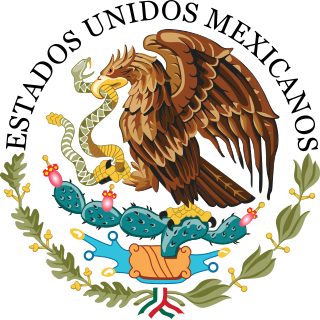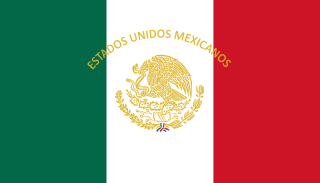Related Research Articles

The politics of Mexico function within the framework of a federal presidential representative democratic republic whose government is based on a multi-party congressional system, where the President of Mexico is both head of state and head of government. The federal government represents the United Mexican States. It is divided into three branches: executive, legislative, and judicial, established by the Political Constitution of the United Mexican States, published in 1917. The constituent states of the federation must also have a republican government based on a congressional system established by their respective constitutions.

The Libertarian Party (LP) is a libertarian political party in the United States that promotes civil liberties, non-interventionism, laissez-faire capitalism, and limiting the size and scope of government. The world's first explicitly libertarian party, it was conceived in August 1971 at meetings in the home of David F. Nolan in Westminster, Colorado, and was officially formed on December 11, 1971, in Colorado Springs. The organizers of the party drew inspiration from the works and ideas of the prominent Austrian school economist Murray Rothbard. The founding of the party was prompted in part due to concerns about the Nixon administration's wage and price controls, the Vietnam War, conscription, and the introduction of fiat money.

Presidential elections were held in the United States on November 7, 1916. Incumbent Democratic President Woodrow Wilson narrowly defeated former associate justice of the Supreme Court Charles Evans Hughes, the Republican candidate.

The Institutional Revolutionary Party is a political party in Mexico that was founded in 1929 as the National Revolutionary Party, then as the Party of the Mexican Revolution and finally as the PRI beginning in 1946. The party held uninterrupted power in the country and controlled the presidency twice: the first one was for 71 years, from 1929 to 2000, the second was for six years, from 2012 to 2018.

The Party of the Democratic Revolution is a state-level social democratic political party in Mexico. The PRD originated from the Democratic Current, a political faction formed in 1986 from the Institutional Revolutionary Party (PRI). The PRD was formed after the contested general election in 1988, which the PRD's immediate predecessor, the National Democratic Front, believed was rigged by the PRI. This sparked a movement away from the PRI's authoritarian rule.

The Chamber of Deputies is the lower house of the Congress of the Union, the bicameral parliament of Mexico. The other chamber is the Senate. The structure and responsibilities of both chambers of Congress are defined in Articles 50 to 70 of the Constitution.
Alasdair Neil Morgan is a former Scottish National Party (SNP) politician. He was Deputy Leader of the Scottish National Party from 1990 to 1991 and served in the House of Commons as the Member of Parliament for Galloway and Upper Nithsdale from 1997 to 2001. He was elected in 1999 as a Member of the Scottish Parliament (MSP) for Galloway and Upper Nithsdale. From 2003 to 2011, he served as a member for the South of Scotland region.

Elections in Mexico are held every 6 years to elect a president and every 3 years to elect a legislature. These elections determine who, on the national level, takes the position of the head of state – the president – as well as the legislature.

Citizens' Movement is a center-left political party in Mexico. It was founded in 1999 under the name Convergence for Democracy, which was then shortened to Convergence in 2002 and changed to Citizens' Movement in 2011.
An independent, non-partisan politician, or non-affiliated politician is a politician not affiliated with any political party or bureaucratic association. There are numerous reasons why someone may stand for office as an independent.

The Instituto Nacional Electoral (INE) is an autonomous, public agency responsible for organizing federal elections in Mexico, that is, those related to the election of the President of the United Mexican States, the members of the Congress of the Union as well as elections of authorities and representatives at local and state levels. The agency's president is Guadalupe Taddei Zavala, appointed in 2023 for a 9-year tenure.

Jesús Ortega Martínez is a Mexican centre-left politician affiliated with the Party of the Democratic Revolution (PRD). He has served in the lower and upper house of the Mexican Congress. He was elected president of the PRD in 2008. He served as president until he was succeeded by Jesús Zambrano Grijalva in 2011.

Germán Martínez Cázares is a Mexican politician and lawyer. He was a member of the National Action Party.

West Coast-Tasman is a New Zealand parliamentary electorate, currently held by Maureen Pugh of the New Zealand National Party as of the 2023 general election. West Coast-Tasman is the largest general electorate in the entire country, with an area larger than the entirety of Belgium. It comprises the entirety of Te Tai Poutini and the Tasman District, as well as Brightwater in suburban Nelson.
Juan Nicasio Guerra Ochoa is a Mexican politician, affiliated with the Party of the Democratic Revolution (PRD).

The president of Mexico, officially the president of the United Mexican States, is the head of state and head of government of Mexico. Under the Constitution of Mexico, the president heads the executive branch of the federal government and is the commander in chief of the Mexican Armed Forces. The office, which was first established by the federal Constitution of 1824, is currently held by Claudia Sheinbaum, who was sworn-in on October 1, 2024. The office of the president is considered to be revolutionary, in the sense that the powers of office are derived from the Revolutionary Constitution of 1917. Another legacy of the Mexican Revolution is the Constitution's ban on re-election. Mexican presidents are limited to a single six-year term, called a sexenio. No one who has held the post, even on a caretaker basis, is allowed to run or serve again. The constitution and the office of the president closely follow the presidential system of government.

The Federal Government of Mexico is the national government of the United Mexican States, the central government established by its constitution to share sovereignty over the republic with the governments of the 31 individual Mexican states, and to represent such governments before international bodies such as the United Nations.

Scott Anthony Simpson is a New Zealand politician and a member of the New Zealand House of Representatives. He is a member of the National Party.
The L Legislature of the Congress of the Union met from 1976 to 1979. This 50th session of Congress consisted of senators and deputies who were members of their respective chambers. They began their duties on September 1, 1976, and ended on August 31, 1979.

General elections were held in Mexico on 1 July 2018. Voters elected a new President of Mexico to serve a six-year term, 128 members of the Senate for a period of six years and 500 members of the Chamber of Deputies for a period of three years. It was one of the largest election days in Mexican history, with most of the nation's states holding state and local elections on the same day, including nine governorships, with over 3,400 positions subject to elections at all levels of government. It was the most violent campaign Mexico has experienced in recent history, with 130 political figures killed since September 2017.
References
- ↑ "Perfil del legislador" (in Spanish). Legislative Information System. Retrieved 15 November 2013.